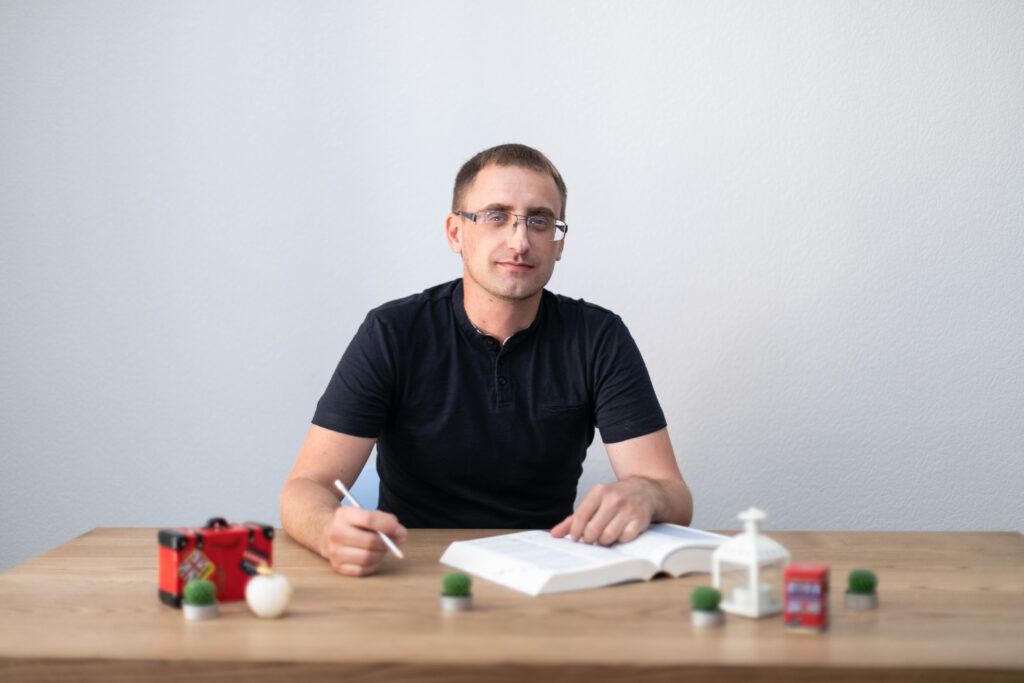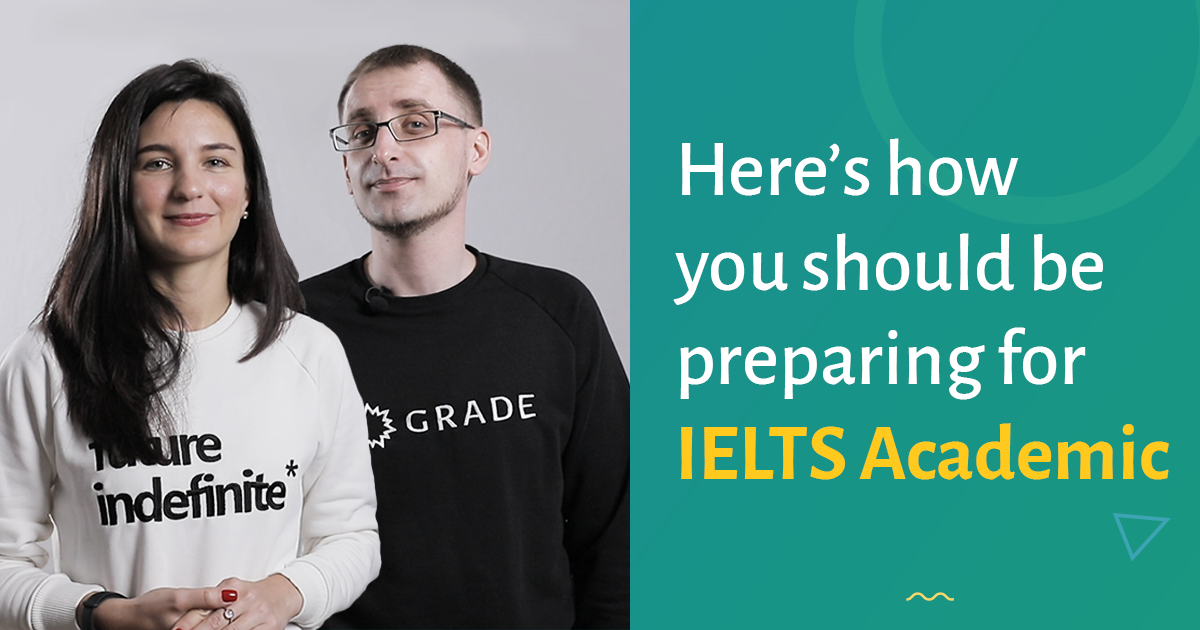An interview with the insiders
Do you agree that IELTS preparation can be nerve-racking, time-consuming and expensive? Nevertheless, you have to take this exam if you want to get a degree from an English-speaking university or pursue a career where you need to have some academic background. Being an IELTS preparation centre for more than 10 years, we have had a lot of experience helping students pass the exam and have seen what difficulties our students face and what they lack in order to get their desirable score. Writing has always been the most challenging part of the test and usually it is Writing where students have had lower scores than in the other sections of the test. A few years ago, this urged us to launch a project helping learners get the most of their preparation time and together with improving their test performance get what they aim at. Today, the insiders, creators and coordinators of IELTS Grade self-study course, Andrii Pigariev and Anfisa Kramarenko, are sharing their insights and ideas to give you a better understanding of what IELTS Academic preparation is and how to make it more effective.
- How would you describe the approach to teaching exam skills and preparing for IELTS in the exam course?
Andrii: Of course, an online is not a face-to-face course with a tutor who could identify and fix your weak areas, but the idea we had was to develop a course that would provide well-rounded preparation that could help learners understand all the varieties of tasks and train completing them within the allotted exam time. Therefore, we started with Writing and then focused on other parts of the test so that our students could receive everything they need in one place.
Anfisa: When creating and upgrading tasks in the course, we are usually guided by the general principles of communicative approach. We also tap into our experience in observing teaching and, more importantly, learning that happens in the classroom, individually and distantly. Insights from all of these environments help us make the experience of our students online more meaningful and effective. One of the most important sources of information on how exactly this or that task should address students’ needs is testing with real users.
- What types of tasks are there? And why those?
Andrii: There are more than 500 tasks in the course and they are different, but there is one thing they have in common – they aim at helping our students go through all the steps of preparation and do this in an interactive way. For example, in order to understand the task, one should answer the questions based on a task, fill in the gaps or match.
Anfisa: Talking about the types of tasks, I would divide them into those where there are definite answers (filling the gaps, matching items, multiple choice questions) and those where students can do a ‘freer’ practice, for instance in writing and speaking, then check their work by themselves, get feedback from tutors and analyse sample responses on the same tasks.
Take IELTS with confidence
Start your IELTS Grade online course
- What teaching methods stand behind these tasks?
Anfisa: Regarding teaching methods, I would look at them from the perspective of a learner, first of all. The logic behind the tasks is aimed at helping students understand and ‘feel’ the exam format, notice and experience difficulties of dealing with exam tasks, learning strategies and useful language to cope with these difficulties, and practice doing it many times to develop a reliable habit for the real test.
Andrii: We don’t provide the materials in lectures or long texts to read – mastering information in this way is time-consuming and the level of retaining isn’t very high. While doing the tasks that we have designed, students learn quicker and process information in more depth – this results in better understanding what to do and remember what has been done, which is an added plus of the course. Being actively involved in the process helps them master the course much more effectively.
READ ABOUT: What to expect at the IELTS Speaking test

- Is there anything the course specialises or focuses on?
Anfisa: From the very beginning, our goal was to assist future candidates in the areas where they feel the most vulnerable. According to our teaching experiences, these were primarily Writing and Speaking — what we call ‘productive’ skills (by contrast with ‘receptive’ Listening and Reading). Therefore, the Writing section is dealt with extremely thoroughly and meticulously. We wanted to really equip our students with strategies and even algorithms of completing exam tasks, and make them follow these algorithms many times during timed practice on the platform, so that they could come into the test room being calm and confident. Right now, we are working on upgrading the Speaking section to a similar level of rigorous and at the same time fulfilling training.
- In the Writing part of the course, there are matching, gap-fill, multiple choice practical exercises. Why did you choose these types of tasks? How can students benefit from them?
Andrii: In order to get a high score in IELTS, it is important to master certain skills, for instance, in essay writing, it is crucial to understand what the task requires us to do. This seems to be a rather obvious thing; however, there are many details that remain neglected by the eye of an untrained student, which automatically leads to a lower score and a lost opportunity. While designing writing and speaking tasks, we focused on the specific of each types of task and explored the skills that have to be mastered for achieving a higher score. In addition, we did our best to provide sufficient practice of these skills, including the language necessary to complete and speaking tasks. In this way, we could say what we’ve developed provides well-rounded preparation starting with a clear understanding of what should be done and how to practicing completing these tasks under exam conditions, and all of this is supported by endless comments, feedback and guidance.
Anfisa: The types of tasks you have just mentioned are aimed at giving students an immediate response on questions, drilling their writing habits, and practicing following their writing plan step by step. Now, this may sound a bit boring, and probably strange, because I know that many people are convinced that writing is about creativity. Not that we are against creativity as it is, — on the contrary, we embrace it — but writing for the test has a lot of strict logic behind it. Exam tasks and requirements to complete them in a certain way are given by the authors of the test for a reason, and exam writing is a clear logical process, rather than a creative ‘stream of consciousness’.
- On your platform, you use AI for checking writing. Is an automated checking system better than human scoring? How do students benefit from it? What is the teachers’ role on the platform?’
Andrii: It is impossible to answer this question just by saying ‘yes’ or ‘no’ as the automated checking system and the teacher’s role on the platform are quite different and both of these have their advantages for learners. Taking the automated system first, its main advantage is speed – one can submit their written tasks and receive a score instantly, and a great benefit of this is the reliability of the result. The thing is that an AI principle is used in the core of this system and the program learns from one writing to another providing an accurate account of the writing performance.
The teacher’s role, however, lies in that a lot of detailed feedback with useful examples and guidance provided at the end of each task and students have another try with the help of prompts. This ensures a great learning effect similar to the one received by students in the classroom, where a teacher guides them towards a better result.
- What types of tasks do you use for improving reading skills? Why?
Anfisa: At the moment, we provide video tutorials on reading. During these tutorials, students learn about the types of tasks they will get in the test, analyse the strategies on completing each type of tasks, and practice completing the tasks ‘together with the video presenter’. Afterwards, the answer to each question in the task is explained. Having watched one tutorial, the student gets a downloadable summary of the main strategies and examples for the type of tasks discussed in it.
READ ABOUT: Tips to tackle true or false questions in IELTS Reading

- How do students learn listening strategies in the course?
Anfisa: Listening is dealt with in the same way as reading. Strategies are introduced through examples of exam questions. While trying the tasks themselves during the video tutorials. students notice what aspects are challenging and how strategies help them perform better.
- How can students practise speaking on the platform?
Andrii: In many ways. First of all, recording themselves and assessing own performance. Obviously, students cannot be objective when listening to their recorded responses but this does give an important tool of self-awareness – understanding own strengths and weaknesses, which stimulates further learning. Then, speaking tasks focus on peculiarities of tasks from each part of the test – from common questions about the weather, which seems to be an easy topic to talk about, but sometimes challenging, as not much can be said about it if this is not a topic of interest, to more complicated and abstract topics in the final part, which require a range of skills to provide a logically organized and meaningful spontaneous response. To some extent, what is done on the platform teaches to frame the mind and express ideas in a logical and clear way – thinking skills are the focus as well. On top of that, there are tasks that focus on improving own language and learn chunks that will help not only win some time to thing, but shape the response and make it more automatic. And finally, since this is a course preparing for the exam, there are numerous opportunities to practice exam tasks and feel the real exam – we are talking about timing here and progressively difficult tasks.
Anfisa: At the moment, in the Speaking section students learn the main information about speaking and what is important for a better speaking performance. Then, they practice answering all types of questions, get feedback on their responses, and listen to sample responses accompanied by the teacher’s comment. Finally, they go through a full imitation of the Speaking test and, once again, get detailed feedback and see sample responses.
- How can their fluency, pronunciation and range of language be assessed?
Andrii: Pronunciation, including fluency, as well as range of language, are the areas of language that aren’t easy to self-assess, and usually we need a teacher or someone who is competent in this sphere to help us. At the same time, some aspects could become more accessible if to make aware of them. For example, if we are explained what fluency is, how to speak so that our speech is fluent and what to do to practice fluency, then it’s quite possible to understand how fluency our speech is. However, this would hardly be possible without recording our own voice and listening to it. The same is true about a range of language. Keeping this in mind, we have focused on these aspects while dealing with the speaking section: our users have a possibility to do tasks related to these aspects, record themselves and check their speaking performance via self-assessment checklist, which will help them better understand where they are now in terms of their speaking performance. In addition, we have designed speaking practice tests which are to be recorded by users and then listened to by IELTS professionals who will check them and provide feedback with the aim of giving a clear picture of what is done effectively and what still should be improved.
Anfisa: In the feedback students get on their answers, their speaking skills are assessed according to all the exam criteria. The feedback is provided in the format of a band + comment on each aspect as well as the total band for the speaking performance.
IELTS Grade is a full-fledged IELTS Academic exam preparation course that has everything you need to get the results you want and not waste your precious time looking for materials, tutors, strategies, or mock exams. We have already done it for you. All you have to do is enjoy learning!
Subscribe to our IELTS digest
READ IN OUR BLOG:
- How to avoid repetition at the IELTS Speaking test
- Tips for writing advantages and disadvantages essays
- How to do multiple choice tasks in IELTS Listening
- How to deal with multiple choice questions in IELTS Reading




